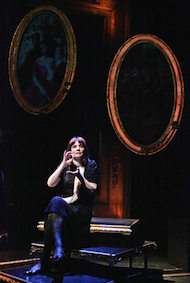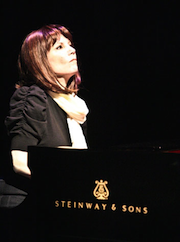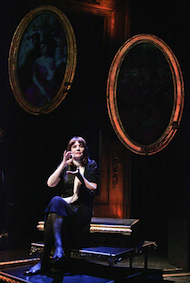
Photos by Michael Lamont
Opening this week at the Berkeley Rep, Mona Golabek's The Pianist of Willesden Lane traces the dramatic history of her own family. Her mother, Lisa Jura, was a talented young pianist, living in Vienna when Germany annexed the country, and the persecution of Jews began in earnest.
England's Kindertransport rescue mission saved the lives of some 10,000 children, mostly Jewish, from Germany, Austria, Czechoslovakia, and Poland, just before World War II broke out. It was the program that saved Jura's life, but at a terrible price. In a story similar to Sophie's Choice, Jura's family of five received only one ticket to London, and the decision to let her escape meant potential doom for the others.
The play moves with Jura from Vienna in 1938 to London during the war. Golabek, an accomplished pianist and music educator, tells the story of her mother's life, and plays the music Jura had performed — two dozen musical selections, from works by Grieg, Beethoven, Chopin, Debussy, Liszt, and others.
The book of the same title is by Golabek and Lee Cohen; it was adapted and directed by Hershey Felder.
There is a somewhat similar story, which gained fame thanks to Roman Polanski's film version of The Pianist, based on Wladyslaw Szpilman's autobiography about the pianist surviving the German occupation of Warsaw and the Holocaust.

I asked Golabek if there is a connection between The Pianist and her The Pianist of Willesden Lane. No, she said, her play is "based on my mother's life story ... I began writing it before [Polanski's] film came out, and my mother's story is quite different: Szpilman was isolated in the Warsaw destruction, my mother lived in a Jewish hostel in London."
Are they related thematically, both dealing with events also depicted in Brundibár, Playing for Time, works about and music coming from Theresienstadt, James Conlon's "Recovered Voices" series? "Yes," Golabek said, "they are related in the theme of music and the arts getting you through the darkest of time."
Golabek has been working on the book that's the basis of her play for several years, but the play's premiere came only in 2012, in Los Angeles' Geffen Playhouse.
The pianist has founded Hold On To Your Music, a foundation devoted to spreading the message of the power of music. With the help of the Milken Family Foundation, Facing History and Ourselves, and the Annenberg Foundation, Golabek created educational resources, which, with her book, have been adopted into school curricula across America.

